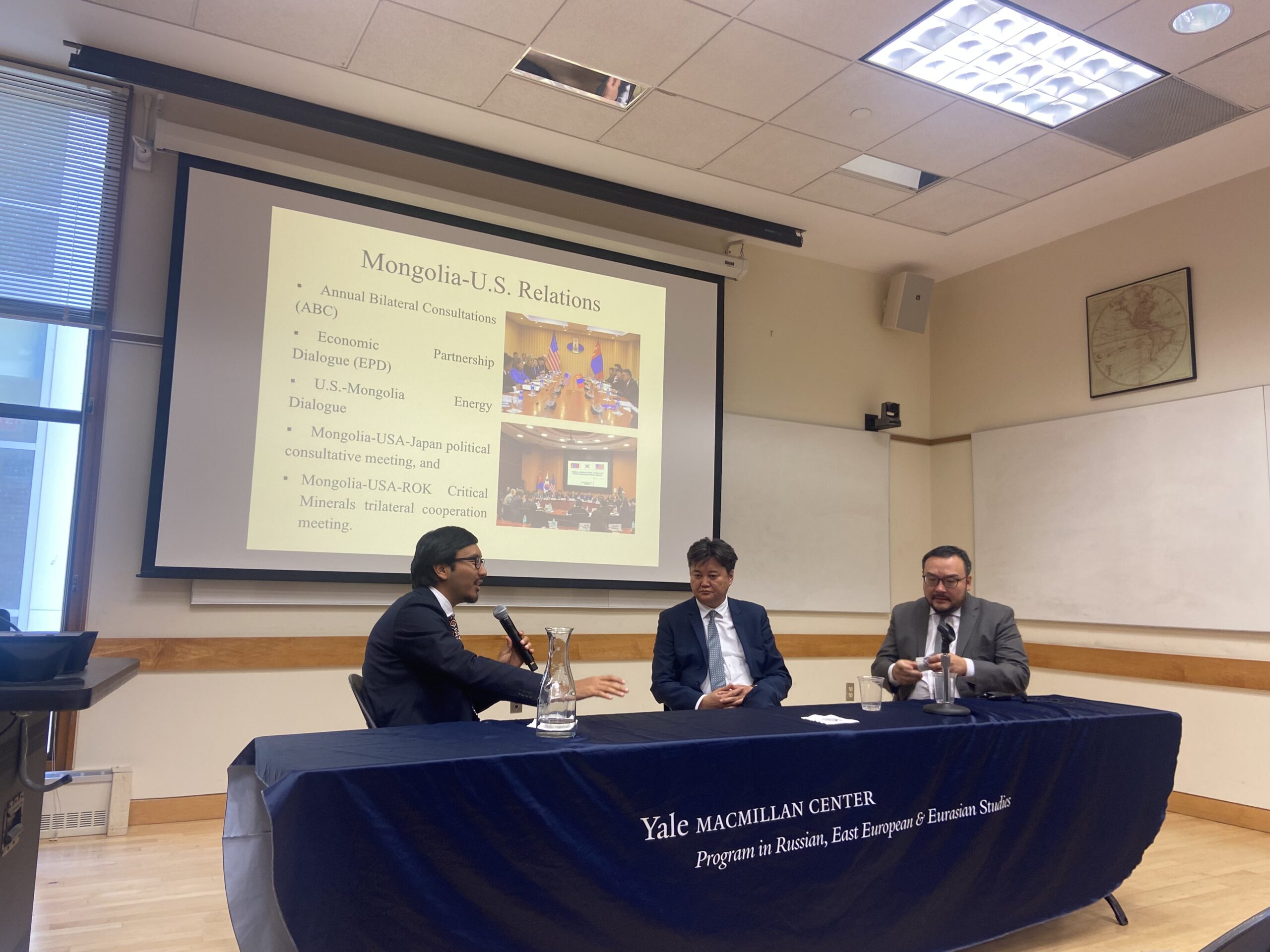Students host Mongolian diplomats to hear about lesser-known foreign policy
Two representatives of the Mongolian embassy in Washington, D.C. spoke to Yale students Friday about Mongolia’s relationship with its neighbors, China and Russia.

Emily Akbar, Contributing Photographer
Battushig Zanabazar and Tegshjargal Tumen — representatives of the Mongolian embassy in Washington — came to Yale on Friday to discuss Mongolia’s unique position in global politics.
In an event hosted at the MacMillan Center by Asian Crossroads at Yale, a central Asian student group, and the Mongolian Association at Yale, the representatives detailed how Mongolia has leveraged its low profile relative to its immediate neighbors China and Russia. The representatives highlighted Mongolia’s investments in partnerships outside these two giants on the international stage.
“We consider every other country, besides our two neighbors, as our third neighbor,” Tumen said. “To balance out our two neighboring giants we look to our third neighbors.”
The event focused on Mongolia’s “third neighbor policy,” which describes how the country has sought out multilateral cooperation and economic relations with non-neighbor countries. The speakers noted that in recent years Mongolia has grown beyond economic dependence on its two neighbors, despite its landlocked geography.
Organizers of the event highlighted the importance of focusing on the governance of smaller countries rather than solely studying larger global players.
Tumen analyzed how Mongolia has stood out in its region since it transitioned to democracy in the 1990s. He recalled U.S. Secretary of State John Kerry referring to Mongolia as an “oasis of democracy” on a visit in 2016.
However, the speakers also highlighted Mongolia’s economic dependence, especially on its large neighbors. According to Zanabazar, nearly 90 percent of Mongolia’s exports, which include mostly coal, go to China, while Russia supplies nearly all of Mongolia’s fuel and 20 percent of its electricity.
“Since we’re squeezed between China and Russia, we sometimes go unnoticed, that’s the challenge,” Tumen said.
Zanabazar spoke on the third neighbor policy from an economic perspective, noting that Mongolia signed free trade agreements to have preferential tariffs and export to more industrialized economies like Japan and South Korea.
The country also recently opened an embassy in Uzbekistan as part of a plan to work more closely with Central Asian countries after the war in Ukraine disrupted traditional trade routes through Russia, Tumen said.
Despite these challenges, the speakers drew attention to key Mongolian policies and attributes that have gained international praise.
Regarding multilateral cooperation, Tumen said that Mongolia’s peacekeeping soldiers are heavily involved in United Nations missions. Especially with Mongolia’s history as a “warrior nation,” Tumen described how their peace-keeping soldiers are uniquely well-trained and well-known within the international community.
“We are proud of them, they are becoming a name card for Mongolia across the world,” he said.
Benjamin Nuland ’27, the co-president of Asian Crossroads at Yale, spoke about the importance of diversifying the geopolitical discussions on campus.
“There are a lot of countries that actually have a pretty interesting way of handling geopolitical issues that are not necessarily brought to light in the Yale community,” Nuland said. “So that includes countries in Central Asia, countries in the Caucasus and also Mongolia.”
Madi Baltagulov SPH ’26, the graduate outreach director of Asian Crossroads at Yale who also facilitated the talk, expanded on the importance of incorporating Central Asian events at Yale.
Baltagulov added that the goal of Asian Crossroads at Yale is to “increase awareness and interest” in the broader region, adding that there is currently a lack of these events at the University.
Attendee Joyce Chow GRD ’26 said she appreciated learning more about Mongolia — a country whose foreign policy she previously knew little about.
“I was surprised by how extensively they have been working to establish themselves in the global arena. It’s something that we don’t really hear a lot about in the news,” Chow said.
The most recent trilateral summit between Mongolia, China and Russia was held on Sept. 2, 2025 in Beijing, as reported by Reuters.







